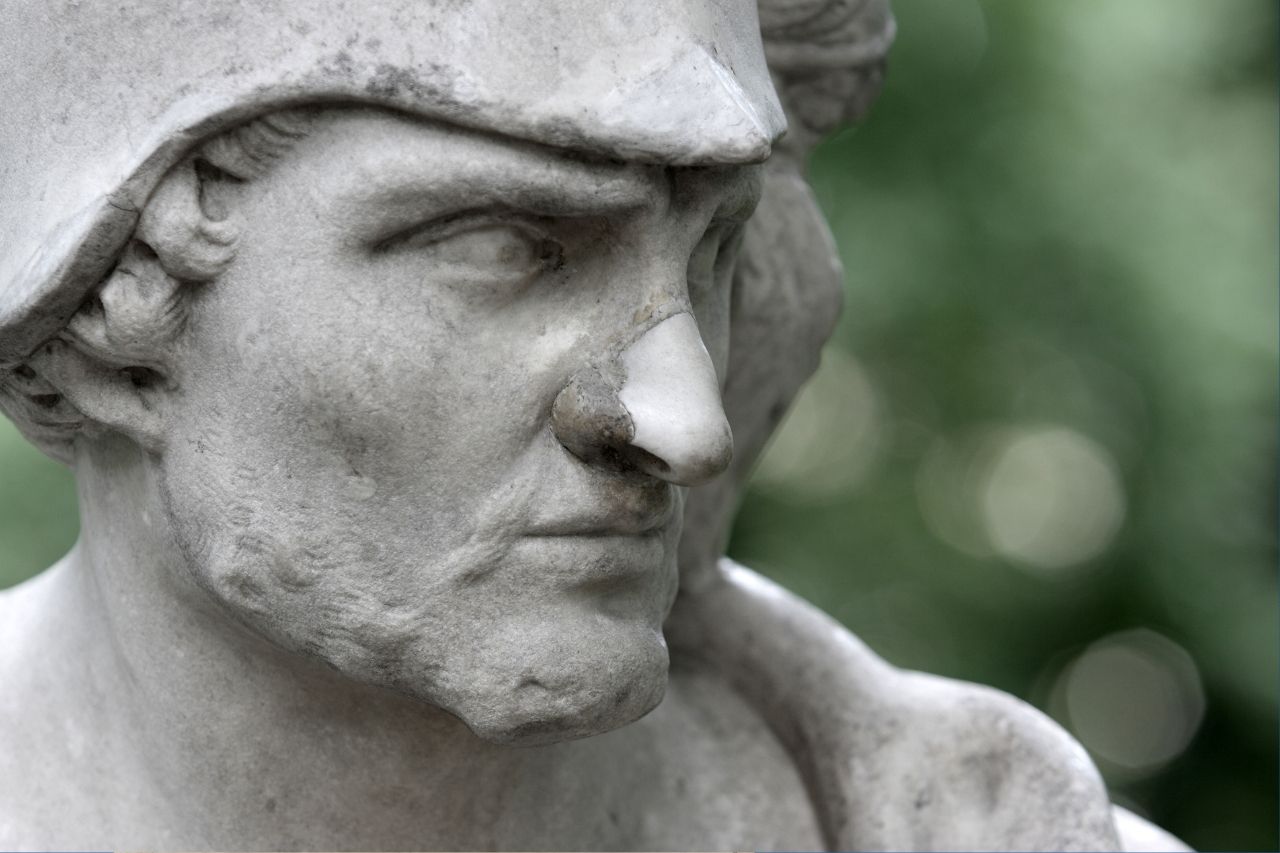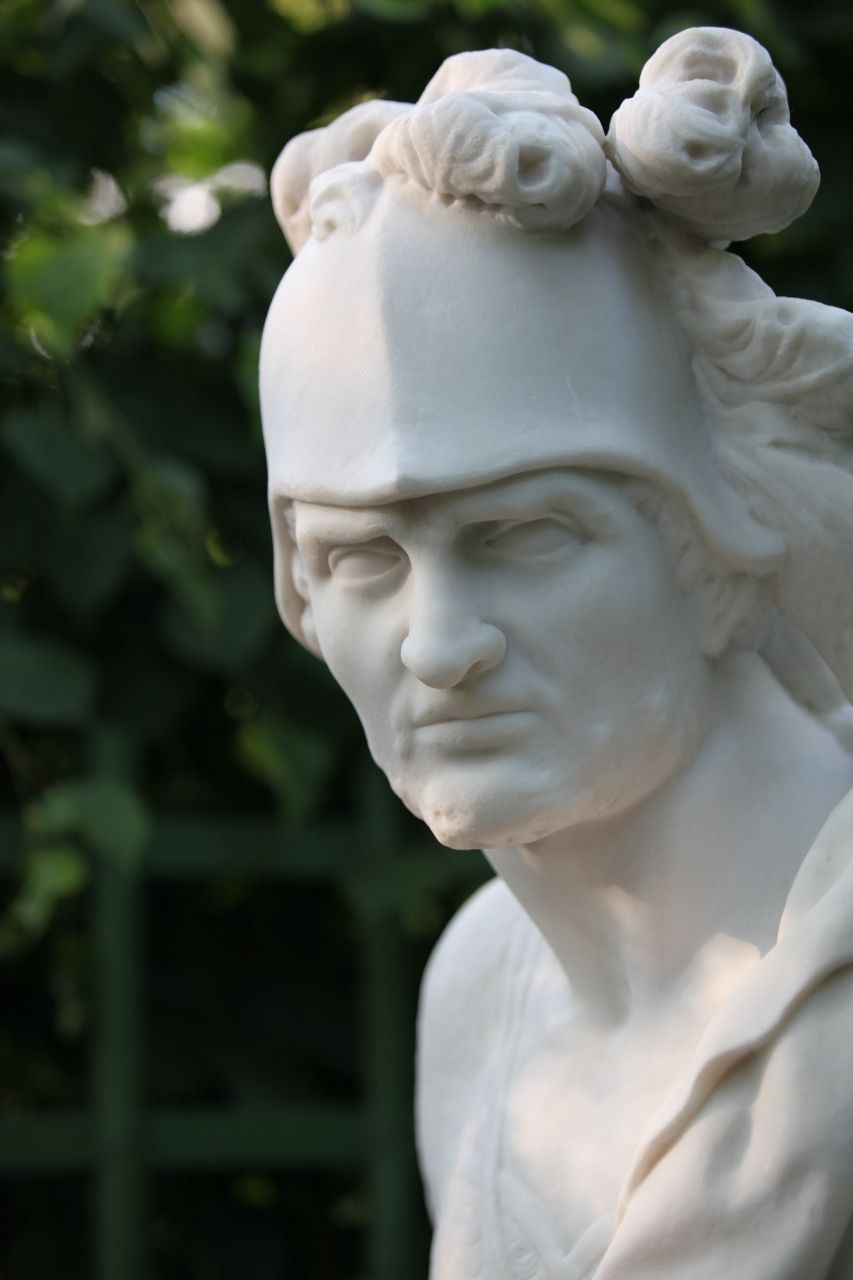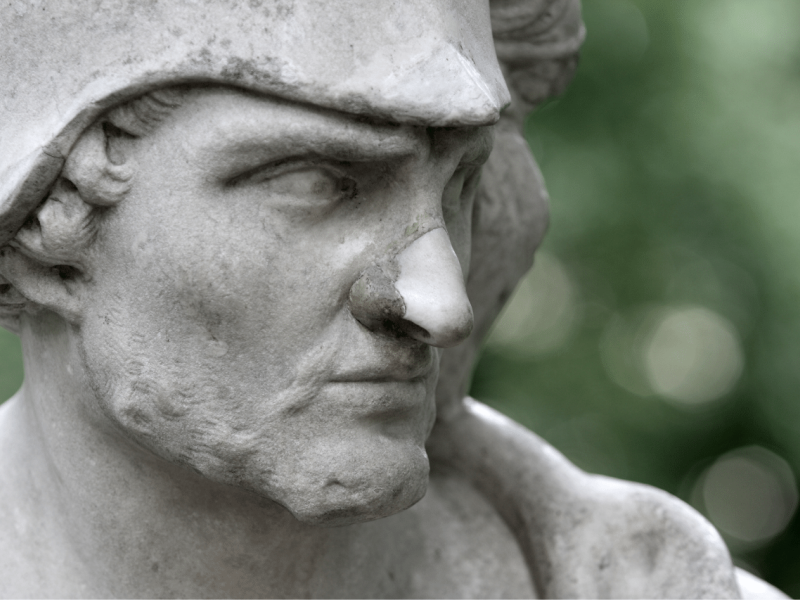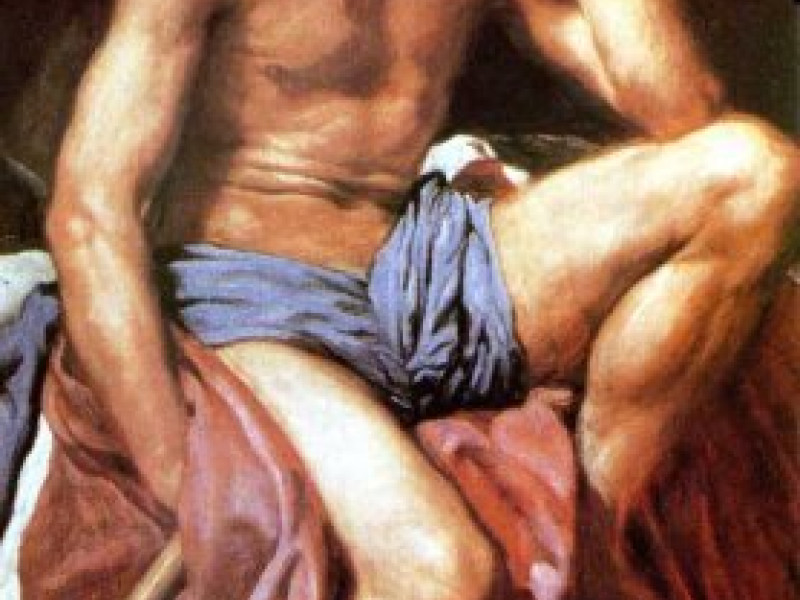Ares
Ares: The Brutal, Bloodthirsty and Unloved Greek God of War
One of the least popular gods in Greek mythology was Ares, god of war. Greeks still worshipped him, but on average they would feel nothing but indifference. They offered half-hearted sacrifices out of obligation, or as an afterthought.
Unlike most of the gods, he was openly ridiculed by the people. The few myths that featured Ares rarely paint a flattering picture of the god, and his stories often ended in shame. Find out more about the most despised god in the entire Greek pantheon!
Ares: Background of the God of War
The city-states of Greece often waged war with invading countries or established new colonies themselves. Often, they also fought each other over territorial disputes. Although conflict was a normal part of life in early civilizations, the Greeks did not value the uglier side of war that Ares represented.
If war was unavoidable, they appreciated Athena’s strategy, wisdom, and cunning far more than the brutality and bloodlust of Ares. Therefore, Athena received much more reverence and worship. Ares, for his part, was more of a necessary evil.
In the ancient Greek language, the word “are” (or “a-re”) is closely associated with war. Originally, though, it meant bane, curse, or destruction. This root form also influenced the modern terms “ire” and “irate”, which perfectly describe Ares’s surly nature.
Who Was Ares in Greek Mythology?
Ares was one of the twelve major Olympian gods in the Greek pantheon. The Greeks who objected to his undignified nature disowned him, saying that he came not from Greece but Thrace, a region of brutish warmongers.
He was the single-minded Greek god of war, violence and destruction. Rather than bravery and selfless sacrifice in defense of a country or an idea, Ares represented merciless rage and indiscriminate slaughter. He never faltered in battle, and he never wearied of standing over the bodies of his fallen enemies. He was aggressive and cranky, and he would often pick fights if he felt ignored or mistreated.
Only the fierce warriors of Sparta and Thrace showed respect to Ares. To them, the god was an emblem of resilience and military spirit. During the war called “the Seven Against Thebes,” the Spartan warlord Menoikeus sacrificed himself to the god to protect the city.
Whether or not the cause was righteous, Ares was inevitably up for a fight. In times of peace, he patronized cutthroats and pirates or, alternately, the armed soldiers who fought them in the name of law and order. Ares didn’t care, as long as there was bloodshed — and a lot of it.
Due to his unruly temper, Ares gained several violent epithets, such as “Shield Piercer,” “City Sacker,” “War Glutton,” and “Curse of Men.
What Was Ares’ Symbol?
All items of warfare were naturally associated with Ares. In the collective imagery, he was a beardless warrior, wearing a helmet and carrying a spear, a sword and a shield. His primary sacred animals were the dog and the vulture, two beasts often seen on the battlefield. He also had a special association with the boar — likely because he tended to charge mindlessly at his enemy.
Strangely, two of Ares’s symbols were other gods. His sons Deimos (dread) and Phobos (fear) always rode into battle besides their father in his chariot, which was pulled by fire-breathing horses.
One could infer that the most common symbol of Ares was blood. The poet Hesiod described Ares by saying his skin was so red that he appeared to be covered in blood even before the battle began.
What Was Ares Known For?
Myths record that Ares co-founded the city of Thebes, a warmongering city-state that thrived around 400 BC. The legend tells that Ares created a water dragon and plagued those who lived in this area. The hero Cadmus killed the dragon and saved the people.
For this reason, Ares became furious and demanded penance. Cadmus planted the dragon’s teeth, and they grew into the fierce soldiers of Thebes known as the Spartoi. Ares forgave Cadmus and gave him his daughter Harmonia as his wife. Together, they parented a dynasty that ruled Thebes for generations.
Ares was also the father of the Amazons, an all-female race of warriors. Allegedly, he and his daughter Harmonia were the parents of Otrera, the first Amazon queen. Some records also reported that he mated with Otrera to father the four most popular Amazon warriors: Hippolyta, Antiope, Melanippe and Penthesilea. Sources differed on the specifics, but it seems incest worked its way into the picture somewhere.
Ares in Roman Mythology
In Roman mythology, Ares was known as Mars, and he was a more intelligent, less bloodthirsty version of the god. He was the father of Romulus and Remus, the classic founders of Rome. He lent his name to a planet and the month of March.
How Was Ares Born?
Ares was the firstborn child of Zeus and Hera, though his demeanor is more like that of a middle child. He had three natural siblings:
Eileithyia, goddess of childbirth and midwives
Hebe, goddess of eternal youth and cupbearer of the gods
Hephaestus, god of volcanoes and master craftsman of the gods
Ares and Hera had an interesting relationship. Though she said she was not fond of him, she often took his side and goaded him into righteous indignance for anything that could be considered an insult. In the Iliad, Zeus too told Ares how much he detested him, and he blamed his son’s demeanor on Ares’ mother, his grumpy consort.
Who Did Ares Marry?
As a typical Greek male god, Ares was rather prolific. Although he was never married, he did have several love affairs and sired many children. The most notable and enduring of these affairs was with Aphrodite, the goddess of love.
She seems an odd match for a brutal god of war, but at their core, both gods were driven by intense passions that would sometimes cause them to act foolishly. Their pairing itself was foolish since Aphrodite was already married to Hephaestus. Though they did have children together, their mating did bring humiliation and embarrassment to both of them. Read the full story later in this article.
Besides Aphrodite, Ares had affairs with Titans, nymphs, demigods, and princesses. Many of his children appeared in myths of their own or went on to found new cities or races. Here is an abbreviated list of Ares lovers and the children born of each union.
Aglaurus (an Athenian princess) – Alcippe
Althaea (queen of Calydon) – Meleager
Aphrodite (goddess of love) – Eros, Deimos, Phobos, Pothos, Himeros, Harmonia
Astynome (unknown) – Diocles, Calydon
Astyoche (a Minyan princess) – Ascalaphus, Ialmenus
Atalanta (an Arcadian princess) – Parthenopaeus
Calliope (muse of poetry) – Edonos, Odomantus, Mygdon
Chryse (granddaughter of Sisyphus) – Phlegyas
Cyrene (a Lapithian princess) – Diomedes, Crestone
Enyo (goddess of war) – Enyalius
Erytheia (one of the Hesperides) – Eurytion
Harmonia (nymph of the Akmonian wood) – Otrera
Otrera (first Queen of the Amazons) – Hippolyta, Antiope, Melanippe, Penthesilea
Sterope (one of the Pleiades) – Evenus
Pelopia (a Theban Princess) – Cycnus, Lycaon
Philonome (maiden of Artemis) – Lycastus, Parrhasius
Protogenia (a Calydonian princess) – Oxylus
Rhea Silvia (a vestal virgin) – Romulus, Remus
Tereine (a river nymph) – Thrassa
Theogone (queen of Lydia) – Timolus
Triteia (a sea nymph) – Melanippus
Considering his moody, selfish and violent nature, one might wonder how Ares managed to have so many lovers. Perhaps the stereotype is accurate, and even the women of ancient Greece were attracted to “the bad boy.”
What Was Ares’ Role in Myths?
Though Ares’ presence is felt throughout Greek mythology, there are few myths where he played a significant part. When he did appear, the myth often related a tale of his humiliation. His legends appeared in the Iliad, the Odyssey, the Argonautica, and other written collections of ancient tales. The minor stories about Ares are listed here, while you can read about the most significant myths in upcoming sections.
Nonnus wrote in his work — the Dionysiaca — that Ares killed the giant Ekhidnades, a formidable enemy of the Olympian gods. Ekhidnades was the son of Echidna, a fearsome monster that was half woman, half serpent.
In Argonautica, Ares was the owner of the famous Golden Fleece. It hung in one of his sacred groves until the adventurer Jason stole it away.
Finally, it would appear that Ares participated in the first Olympic Games, held in celebration of Zeus. He lost to Apollo in the boxing ring, a signal that virtue and civility would always defeat brute strength in times of peace.
Ares and the Aloadae
It seems that Ares suffered humiliations throughout all of his life. In the Iliad, the goddess Dione told her daughter Aphrodite about one of the early humiliations of Ares.
Otus and Ephialtes were two giants who lived in the Underworld. Together, the brothers were called the Aloadae. After the Olympian gods defeated the giants in the Gigantomachy, the Aloadae decided to take revenge. Therefore, they plotted to abduct Hera and Artemis. But first, they kidnapped the young Ares, bound him in chains, and placed him in a large urn.
He was imprisoned there for an entire lunar year — or thirteen months — screaming and howling for his release. It speaks volumes about his family’s ambivalence that no one noticed he was missing or tried to look for him in all that time.
At last, the giants’ stepmother, Eriboea, pitied Ares, and she told Hermes what the giants had done. Hermes took Artemis with him into the Underworld. While Hermes rescued Ares, Artemis distracted the giants. She transformed into a deer, and as they prepared to shoot her with their bows, she darted between them. Otus and Ephialtes ended up killing each other.
The Indiscretion of Ares and Aphrodite
According to the Odyssey, Ares had an illicit love affair with the goddess Aphrodite, who was married to Hephaestus. Worse yet, they chose to conduct their trysts right in Hephaestus’s home. Ares would place the young soldier Alectryon by the door to warn the pair if anyone was coming. Unfortunately, one day, Alectryon fell asleep on duty.
The god Helios of the sun happened to see the lovers, and he told Hephaestus. Enraged, the betrayed Hephaestus fashioned an almost invisible net. He snared Ares and Aphrodite, trapping them in an embarrassingly intimate sexual embrace.
To inflict the highest amount of shame, Hephaestus invited the other Olympian gods to look at the spectacle. Out of modesty, the other goddesses declined. However, the male gods came to see the entwined lovers, jeering at them and mocking them. Many gods remarked that they would gladly trade places with Ares because Aphrodite was quite beautiful. Surely this part of the event did not amuse Hephaestus, but hopefully, his revenge was worth it.
The Intercession of Poseidon
The Odyssey records that Poseidon showed some empathy toward the disgraced lovers and tried to reason with Hephaestus.
“For Poseidon there was no laughing; he kept imploring the master smith Hephaistos in hopes that he would let Ares go. He spoke in words of urgent utterance: ‘Let him go; I promise that he shall pay in full such rightful penalty as you ask for–pay in the presence of all the gods.”
But the great lame craftsman answered him: “Poseidon, Sustainer of the Earth, do not ask this of me. Pledges for trustless folk are trustless pledges. If Ares should go his way, free of his chains and his debt alike, what then?”
Homer, Odyssey
When Hephaestus finally released the chastised lovers, Aphrodite fled to Paphos, her city in Cyprus. Before Ares returned in shame to his home in Thrace, he turned the errant soldier Alectryon into a rooster, who would thereafter crow loudly whenever the sun god appeared in the sky.
Some sources recorded that after this dreadful scene, Aphrodite officially divorced Hephaestus and became the consort of Ares.
Ares and Hercules
Cycnus was one of the many children of Ares, and he shared his father’s bloodthirsty nature. One of his pastimes was killing pilgrims on the road to Delphi, keeping them from reaching the oracular temple. He wanted to build a temple with the bones and skulls of the faithful. Of course, Apollo was annoyed by this murderous behavior.
Apollo sent his son, the famous Hercules, to take care of the situation by killing Cycnus. Infuriated by his son’s death, Ares set off in a berserker rage and engaged Hercules in battle. The struggle was fierce, but Athena gave Hercules her protection. Eventually, Ares was wounded, and he crawled away in shame.
Ares and the Trojan War
As one might expect, Ares played a role in the Trojan War. The Iliad records that he changed his patronage and supported the Trojans, largely because Aphrodite persuaded him to fight for them. The Greek god of battle was ruthless as always, but this time, he fought for the enemy.
Ares almost secured the Trojans’ victory. However, Athena and Zeus intervened on behalf of the Greeks and saved the day. Athena managed to inflict a grievous wound on Ares with a single large rock.
The Iliad also documents the scene after one battle, which shows there was no love lost between Zeus and Ares. One day during the fighting, Diomedes wounded Ares with his spear. Indignant, Ares went to Zeus to complain about his mistreatment. Zeus confessed that only filial obligation kept him from banishing Ares entirely.
“Then looking at him darkly, Zeus who gathers the clouds, spoke to him:
‘Do not sit beside me and whine, you double-faced liar.
To me, you are the most hateful of all gods who hold Olympus.
Wars and battles, forever quarreling, is dear to your heart.
You have your mother’s uncontrollable rage – incorrigible,
That Hera – say what I will, I can hardly subdue her.
Hera’s urgings, I trust, have made you insufferable.
And yet I will not long endure to see you in pain, since
You are my child, and it was to me that your mother bore you.
But were you born of some other god and proved so ruinous,
long since you would have been dropped beneath the gods of the bright sky.’”
-Homer, Iliad
Conclusion
Ares was the god that the Greeks loved to hate. As much as they prized democracy and civilized society, war was a grim reality in their lives. Though they were never fond of Ares, they accepted him as a necessary part of their pantheon. Below are a few facts to remember about this unloved god.
Ares was the god of war. Unlike Athena, he was bloodthirsty and barbaric.
He was the son of Zeus and Hera, and both of his parents publicly ridiculed him.
He never married, but he had many lovers; his most well-known affair was with Aphrodite.
He fathered many famous children, including Phobos and Deimos, Romulus and Remus, and the original Amazons.
He had minor cults in Sparta and Thrace, but everywhere else in Greece people worshipped him as an afterthought or as a necessity before the battle.
Most of Ares’ myths end in crushing defeat or humiliation and ridicule.
Greek poets delivered a clear message through the constant mockery and defeat of Ares: Violence and indiscriminate carnage should never be celebrated. When war was unavoidable, strategy and calculation would always prevail over anger and aggression.












